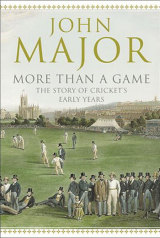More Than a Game: The Story of Cricket's Early Years by John Major (HarperPress ) 416pp £25.00

When I asked a friend what he remembered about John Major - who was, after all, prime minister of the UK for six-and-a-half years - he thought long and hard before offering a short answer: "Didn't he spend all his time watching cricket?"
Given the state of the Conservative party when he left office in 1997, he might as well have. But there was no doubting that Major was passionate about the game and was not afraid to show that despite it being unfashionable in a decade when football epitomised Cool Britannia.
After handing in his resignation to the Queen he went straight from Buckingham Palace to watch his beloved Surrey at The Oval. " You had a rough decision, mate," one regular called out. It's hard to imagine Tony Blair getting the same treatment at St James's Park. Then again, Major's passion about his favoured game is genuine.
It would be too easy to assume that a cricket-loving Conservative prime minister came from a traditional public school-Oxbridge background. Far from it. Major's upbringing was far from easy and cricket gave him a much-needed escape, either playing or watching Surrey in an era in which they dominated the domestic game.
His introduction to this book is revealing and enthralling. His career opened many doors although he never seems to have quite cast off the boyish thrill of meeting players he grew up idolising.
All that enthusiasm comes across in the book. The subject - the history of the game from its origins up to the outbreak of the Great War - might seem dull, a word often used to describe Major himself. Like Major, though, the book is anything but.
In fairness, the first chapter or two are hard work and rather remind the reader of a poor history book, long on facts, short on colour. That's not entirely his fault, as not much is known about the game's origins, but brevity might have made for a better and easier read.
But once through that roadblock, the narrative opens up and Major's passion is allowed to spill into the writing. By the late 18th century the game was slowly growing and characters emerging. It really took off as a national pastime in the 1840s when the explosion of the railway network opened up the country. The expansion of the Empire meant that the game was exported, initially restricted to the British but soon taken up by locals, often in the face of tremendous obstacles.
The real growth from a minority pastime into a global obsession came in the second half of the 19th century, and the man who did more than anyone to take it to new heights was WG Grace, in his time the most identifiable man in the world. He first played in 1864, and took a relatively elitist pastime and turned it into a global sport. He was still playing 50 years later when the Great War started and this book ends. And yet he is treated rather harshly, even if there is little new to be added to what we already know. He was almost certainly selfish and anything but an amateur, but Major stresses this often at the expense of other achievements.
There are other gaps. The role of the public schools - unfashionable though that subject might be - women's cricket, league cricket. All warrant little more than passing references.
There have been several previous attempts to cover cricket's early years; most have ended up being dry and too academic. Major has helped the history of the game he loves by sidestepping that pitfall, even if it means offering relatively little that's new, and producing a thorough - as you might expect - and generally well-researched book.
That would not be enough if it wasn't readable as well, but it is. Grey it is not, rather like the man himself.
Martin Williamson is executive editor of Cricinfo

